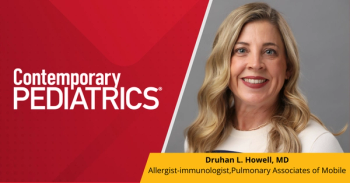
- Consultant for Pediatricians Vol 6 No 5
- Volume 6
- Issue 5
Herpes Zoster Meningitis: On Diagnosis-- and Therapy
I enjoyed Drs Olivera and Lasser's recent "Case In Point" involving an 18-year-old with varicella-zoster virus (VZV) meningitis1 and found the case and illustrations informative and interesting.
I enjoyed Drs Olivera and Lasser's recent "Case In Point" involving an 18-year-old with varicella-zoster virus (VZV) meningitis1 and found the case and illustrations informative and interesting.
I would point out one incorrect statement. The authors wrote: "The lumbar puncture confirmed the diagnosis of meningitis. . . . CSF glucose and protein levels were normal at 48 mg/dL and 136 mg/dL, respectively." However, a protein level of 136 mg/dL is not normal for an 18-year-old. For children and adults, normal CSF protein levels range from 5 to 40 mg/dL. A value of 136 mg/dL for CSF protein is considered to be above the mean for both preterm and term infants, although within the range of accepted values for these newborns. The authors should have indicated that the CSF protein level was elevated for a patient of this age.
While I concur with the authors' assertions that treatment of VZV meningitis is controversial and that there are insufficient data to support a treatment recommendation to reduce duration or severity, it is understandable that these data are not available. Because the diagnosis of VZV meningitis usually depends on the results of a polymerase chain reaction (PCR) assay of the CSF--which may not be routinely available--most patients with clinical or laboratory indicators consistent with viral meningitis are empirically treated with acyclovir. This antiviral agent may significantly reduce the clinical progression and sequelae of herpes simplex virus (HSV)-1 and HSV-2 meningitis and encephalitis. This is important because at presentation, it is unlikely that a clinician would have results to rule out an HSV-1 or HSV-2 cause.
Pharmacokinetic studies make it clear that intravenous acyclovir is the optimal formulation of the drug to ensure adequate absorption and serum and CSF levels of the medication. The bioavailability of oral acyclovir is extremely poor, and CSF levels would likely be suboptimal. Therefore, in a patient with viral meningitis, I would empirically choose intravenous acyclovir until the results of CSF PCR testing are available.
---- Andi L. Shane, MD, MPH Assistant Professor Division of Pediatric Infectious Diseases Emory University School of Medicine Atlanta
Dr Shane is correct. We should have noted that the CSF glucose level was normal and that the CSF protein level in our patient was elevated--presumably because of the increased number of white blood cells in the CSF. I am not familiar with the recommendation for empiric treatment of viral meningitis with acyclovir. My understanding is that most causes of viral meningitis in older, healthy children are self-limited and that therefore only symptomatic treatment is required.2 If our patient had signs or symptoms of encephalitis, or if he was a neonate with a history or physical findings that suggested viral meningitis, we certainly would have treated with intravenous acyclovir pending results of CSF culture and PCR assays. This patient's case was unusual in that the diagnostic rash was not evident at the time of presentation; by the time the diagnosis was made, the patient no longer had symptoms of meningitis.
A search of the literature yielded no recommendations about whether to treat VZV meningitis in an otherwise immunocompetent patient.Our current practice is to order cultures for bacteria and a PCR assay of the CSF for Enterovirus; we also request serum Lyme titers for all patients with suspected meningitis. We have not routinely ordered assays for HSV or VZV. Now that PCR testing is easily available--with very sensitive and specific results--it would be interesting to study the frequency of VZV reactivation as a cause of viral meningitis.
This case led me to believe that, like most other causes of viral meningitis in healthy children, VZV meningitis is self-limited and without significant morbidity.
---- Elizabeth Olivera, MD Pediatric Hospitalist Howard County General Hospital Columbia, Md Clinical Instructor Johns Hopkins University Baltimore
References:
REFERENCES:
1.
Olivera EK, Lasser M. Herpes zoster meningitis.
Consultant For Pediatricians.
2007;6:108-112.
2.
Di Pentima C. Clinical manifestations and management of viral meningitis in children. UpToDate online. Available at: http://www. uptodate.com/physicians/infectious_disease_toclist.asp. Accessed March 6, 2007.
Articles in this issue
over 14 years ago
LEOPARD Syndromeover 18 years ago
What Caused Eczema to Flare in This Toddler?Newsletter
Access practical, evidence-based guidance to support better care for our youngest patients. Join our email list for the latest clinical updates.








